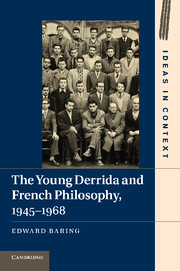Book contents
- Frontmatter
- Contents
- Acknowledgments
- A note on translations and reproductions
- Introduction
- Part I Derrida post-existentialist
- Chapter 1 Humanist pretensions
- Chapter 2 Derrida's “Christian” existentialism
- Chapter 3 Normalization
- Chapter 4 Genesis as a problem
- Chapter 5 The God of mathematics
- Part II Between phenomenology and structuralism
- Epilogue
- Bibliography
- Index
- References
Chapter 2 - Derrida's “Christian” existentialism
from Part I - Derrida post-existentialist
Published online by Cambridge University Press: 05 November 2011
- Frontmatter
- Contents
- Acknowledgments
- A note on translations and reproductions
- Introduction
- Part I Derrida post-existentialist
- Chapter 1 Humanist pretensions
- Chapter 2 Derrida's “Christian” existentialism
- Chapter 3 Normalization
- Chapter 4 Genesis as a problem
- Chapter 5 The God of mathematics
- Part II Between phenomenology and structuralism
- Epilogue
- Bibliography
- Index
- References
Summary
It was in this broader history of postwar French intellectual life that Derrida was first introduced to philosophy and developed his ideas. From his 1952 admission to the ENS as a student, until he reentered it as a teacher in 1964, Derrida was what could be described as a “post-existentialist,” navigating the phenomenological wilderness after the decline of the dominant Sartrean interpretation. As I will show later in this book, Derrida was no structuralist, much less a post-structuralist, before 1964. Structuralism, in the 1950s, developed outside the tightly limited philosophical world to which Derrida aspired, and only had a minimal impact there. Rather it was to the inheritors of the phenomenological legacy, in their communist and Christian guises, that Derrida was drawn, caught up in both the new communist reading of Husserl, and much later the Christian reading of Heidegger. Although Derrida very rarely mentioned Sartre in the 1950s, the existentialist's philosophy still exerted a strong, if negative, influence, commanding Derrida's thoughts at one degree removed.
Derrida's break with Sartre and his slow liberation from Sartrean readings of Husserl and Heidegger, however, were built upon an initial fascination. For, as a schoolboy before 1952, Derrida saw himself as an existentialist, attracted to philosophy by the charms of the quintessential intellectual. The existentialist Derrida was, to be sure, a very young man, and his early essays lack the nuance and sophistication of his later writings. His schoolwork remains, however, instructive. First, as we shall see, it provides a frame for thinking about the development of Derrida's thought: the traces of his earliest interests can be picked out in his more mature philosophy and they inform my reading of it. Second, corresponding to the broader ambitions of this book, these early essays shed light on an aspect of existentialism that, historically, set it apart from other philosophical movements. In the late 1940s, the teenage Derrida was not alone in waiting for key existentialist texts to arrive on the shelves of a local librairie. Existentialism found devotees amongst the young all over France. To explain the reception of existentialism and to understand the stakes of debates over it, we must first grapple with its extraordinary influence over a generation that entered adulthood in a newly liberated France.
- Type
- Chapter
- Information
- The Young Derrida and French Philosophy, 1945–1968 , pp. 48 - 81Publisher: Cambridge University PressPrint publication year: 2011



